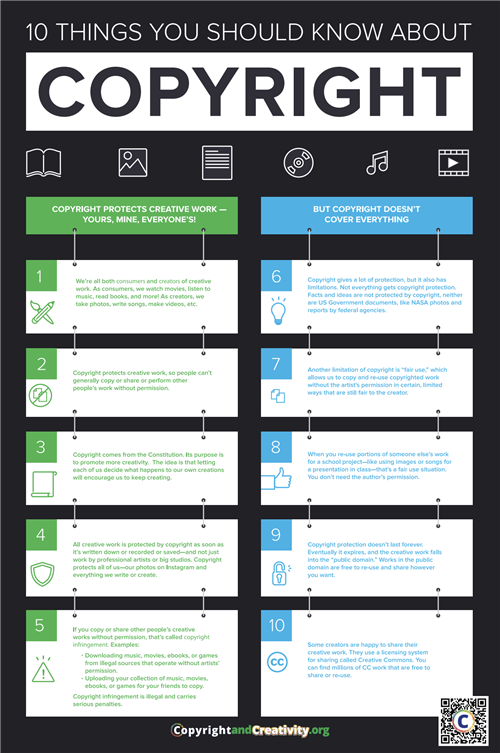-
Copyright and Fair Use
Copyright and Fair Use are difficult and ever-changing topics.
In short, copyright provides legal protection for original creative works. Copyright holders have rights that include:
- Displaying or performing work in public.
- Reproducing a whole work or parts of it.
- Distributing copies of the work.
- Taking from works, such as translations or dramatizations.
Keep in mind, copyright protection does have limitations. Under Fair Use, copyrighted material can be used under certain restrictions, without the copyright holder’s permission, for purposes such as news reporting, teaching, and research.
What are the four factors of Fair Use, and what questions should you ask?
- Purpose and character of use. Will the user gain profit from the use of the work?
- Amount of work to be used. What percentage of the work will be used? How long will the work be used?
- Nature of the work. Is the work a book whose publisher prohibits public distribution with or without profit? Will the work be displayed on a public-facing website?
- Effect of any use on the market for the work. Will the use interfere with the copyright holder's ability to obtain profit from their own work?
Keep in mind that just because you are using for educational purposes, that does not guarantee you permission to copy or distribute copyrighted work. Each use should be evaluated individually.
Please consult the resources in the tabs below, and remember you can obtain guidance about copyright and fair use from your Irving ISD campus librarian.
-
Copyright Resources for Teachers, Staff, and Administrators
The following resources will support your understanding of educational fair use:
Copyright and Fair Use Information for Teacher and Administrators with links to IISD Board Policy (CY Local) and (CY Legal)
Copyright Crash Course for Educators (UT) - Understanding Fair Use
Fair Use Evaluator - This tool will help you better understand how to determine the "fairness" of a use under the U.S. Copyright Code.
A Teacher's Guide to Copyright and Fair Use - Edutopia article that provides information and helpful resources.
-
Copyright Resources for Teaching Librarians
- Common Sense Media - Creativity, Copyright, and Fair Use
- Copyright and Creativity Website
- Common Sense Media - Digital Citizenship: Creative Credit and Copyright
- American Library Association - Copyright Tools for Librarians
- Public Domain Slider
- Section 108 Spinner
- Exceptions for Instructors eTool
-
Copyright Resources for Students
10 Things You Should Know About Copyright
Online Library Resources such as WorldBook and Britannica, offer embedded citation tools in articles to assist with ease of source citation. Log into Online Library Resources on Launchpad.
-
Copyright
In the digital age there is a vast amount of content available online. This instant availability makes it is very easy to copy the creative works of others. While educators and students receive some allowance for educational fair use of copyrighted materials, there are still laws and guidelines pertaining to their use. It is important for educators to understand copyright and fair use in order to:
- maintain professional integrity.
- serve as a role model for students.
- ensure protection from copyright infringement.
The resources below will support the understanding of copyright and fair use. Also included are resources for the instruction of students on copyright and fair use. Additonally, resources are provided for students to use when determining fair use of creative works during product creation for both school assignments and personal use.
-
Still need support?
Click on the icon below to complete the Google Form and receive a response to your copyright question.
You must have a valid Irving ISD email address to complete the form.



